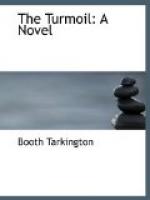As it happened, Bibbs was literally watching “that woman.” Glancing from the window, he saw Sibyl pause upon the pavement in front of the old house next door. She stood a moment, in deep thought, then walked quickly up the path to the door, undoubtedly with the intention of calling. But he did not mention this to his sister, who, after delivering herself of a rather vague jeremiad upon the subject of her sister-in-law’s treacheries, departed to her own chamber, leaving him to his speculations. The chief of these concerned the social elasticities of women. Sibyl had just been a participant in a violent scene; she had suffered hot insult of a kind that could not fail to set her quivering with resentment; and yet she elected to betake herself to the presence of people whom she knew no more than “formally.” Bibbs marveled. Surely, he reflected, some traces of emotion must linger upon Sibyl’s face or in her manner; she could not have ironed it all quite out in the three or four minutes it took her to reach the Vertreeses’ door.
And in this he was not mistaken, for Mary Vertrees was at that moment wondering what internal excitement Mrs. Roscoe Sheridan was striving to master. But Sibyl had no idea that she was allowing herself to exhibit anything except the gaiety which she conceived proper to the manner of a casual caller. She was wholly intent upon fulfilling the sudden purpose that brought her, and she was no more self-conscious than she was finely intelligent. For Sibyl Sheridan belonged to a type Scriptural in its antiquity. She was merely the idle and half-educated intriguer who may and does delude men, of course, and the best and dullest of her own sex as well, finding invariably strong supporters among these latter. It is a type that has wrought some damage in the world and would have wrought greater, save for the check put upon its power by intelligent women and by its own “lack of perspective,” for it is a type that never sees itself. Sibyl followed her impulses with no reflection or question—it was like a hound on the gallop after a master on horseback. She had not even the instinct to stop and consider her effect. If she wished to make a certain impression she believed that she made it. She believed that she was believed.
“My mother asked me to say that she was sorry she couldn’t come down,” Mary said, when they were seated.
Sibyl ran the scale of a cooing simulance of laughter, which she had been brought up to consider the polite thing to do after a remark addressed to her by any person with whom she was not on familiar terms. It was intended partly as a courtesy and partly as the foundation for an impression of sweetness.
“Just thought I’d fly in a minute,” she said, continuing the cooing to relieve the last doubt of her gentiality. “I thought I’d just behave like real country neighbors. We are almost out in the country, so far from down-town, aren’t we? And it seemed such a lovely day! I wanted to tell you how much I enjoyed meeting those nice people at tea that afternoon. You see, coming here a bride and never having lived here before, I’ve had to depend on my husband’s friends almost entirely, and I really’ve known scarcely anybody. Mr. Sheridan has been so engrossed in business ever since he was a mere boy, why, of course—”




